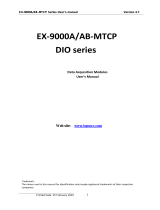
PMD-2201 User Manual for Local Display Operation
List of Figures
Figure1-1: PMC/PMD System Architecture ...................................................... 1
Figure2-1: PMD-2201 Home Page ................................................................... 3
Figure2-2: Toolbar function area ...................................................................... 3
Figure2-3: “Login” Page ................................................................................... 4
Figure2-4: Toolbar function area (login as Administrator) ................................... 4
Figure2-5: “Tools” Page ................................................................................... 5
Figure2-6: Power Meter Utility Interface ........................................................... 5
Figure3-1: Home Page ..................................................................................... 7
Figure3-2: System Setting Overview Page ...................................................... 8
Figure3-3: Time Setting Page .......................................................................... 8
Figure3-4: Network Setting Page ..................................................................... 9
Figure3-5: Security Setting Page ................................................................... 10
Figure3-6: Other setting page ........................................................................ 11
Figure3-7: Backlight Setting Slider ................................................................. 12
Figure3-8: Calibration Setting process ........................................................... 12
Figure4-1: Module Overview page ................................................................. 13
Figure4-2: I/O Interface Setting page (Com Port) .......................................... 14
Figure4-3: Function setting to connect to Modbus RTU slave module ........... 15
Figure4-4: Function setting to connect to HMI or SCADA .............................. 16
Figure4-5: I/O Function setting about LAN ..................................................... 17
Figure4-6: Power Meter Setting Page ............................................................ 18
Figure4-7: The “Scan” button to search Power Meter .................................... 19
Figure4-8: Set up the Scanning Range for the Power Meters ........................ 19
Figure4-9: Scanning the Power Meters .......................................................... 20
Figure4-10: The Power Meter List after Scan operation................................. 20
Figure4-11: Select the actual Power Meter connected to PMD-2201 ............. 21
Figure4-12: Set up the No. and Address of the power meter ......................... 21
Figure4-13: Select Modbus RTU Power Meter module .................................. 21
Figure4-14: Add the Modbus RTU Power Meter manually ............................. 22
Figure4-15: Set up the Network setting of the power meter ........................... 23
Figure4-16: Select Modbus TCP Power Meter module .................................. 23
Figure4-17: Add the Modbus TCP Power Meter manually ............................. 23
Figure4-18: Power Meter List Interface .......................................................... 24
Figure4-19: PM-3133 Setting page (Basic Setting) ........................................ 25
Figure4-20: PM-3133 Setting page (Power Related Setting) ......................... 26
Figure4-21: PM-3133 Setting page (I/O Setting) ............................................ 26





















